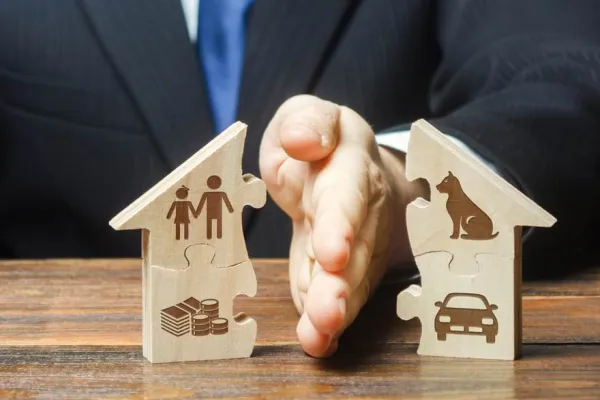The Capital Gains Tax was introduced to limit the profit someone can make on an asset that has increased in value.
Many questions have sprung up about Capital Gains Tax in recent years, as people try to stay current with the changing thresholds.
For example, who pays Capital Gains Tax? And what happens if you don’t make your payments?
Keep reading our article below for everything you need about Capital Gains.
What is Capital Gains Tax?
When you buy an asset that has increased in value since you first purchased it, you will need to pay a tax on your profits.
This does not apply to your primary property, but it does to any extra houses you own in addition to that one.
Other items you may need to pay Capital Gains Tax include shares, business assets, wine, jewellery, coin collections, and more.
You pay this tax when you sell the item and receive your earnings.
However, remember that every person has an annual tax-free allowance, which means they don’t have to pay any tax. In 2024/25, this figure is £3,000.
How much is Capital Gains Tax on property?
At the time of writing, if you’re a higher or additional rate taxpayer, you will pay 24% on your gains from residential property.
Meanwhile, if you’re a basic-rate income taxpayer, you will pay 18% on gains from residential property.
Who pays Capital Gains Tax?
Even if you have sold an asset that has increased in value, you only pay Capital Gains Tax on what are referred to as ‘chargeable assets’.
You may choose to file this tax return yourself, or you could spend a qualified accountant to do it for you, if you are confused by the process or simply don’t want the hassle.
As mentioned above, these include:
- Most personal possessions worth £6,000 or more
- A house that’s not your main one (e.g. inherited property)
- Your main home if you’ve let it out or used it for business
- Any shares that are not in an ISA or PEP
- Business assets
By contrast, you do not need to pay Capital Gains Tax on gifts to your husband, wife, civil partner or a charity.
Similarly, you don’t pay it on profits made from:
- ISAs or PEPs
- UK government gilts and Premium Bonds
- Betting, lottery or pools winnings
You only pay Capital Gains Tax over your annual tax-free allowance, which between 2024/25 is currently £3,000, or £1,500 for trusts.
Who pays Capital Gains Tax – the seller or the buyer?
Capital Gains Tax is paid by the seller of the property, as it is paid on the amount of profit made from the sale.
The buyer may have to pay Stamp Duty, which is a different kind of tax.
If you are buying and selling a property, you may be liable to pay Capital Gains Tax for the sale where you act as the seller and stamp duty for the other transaction in which you are the buyer.
What happens if I don’t pay Capital Gains Tax?
If you owe Capital Gains Tax, then you should file the return within 60 days.
If you fail to do so, penalties and interest will be charged. You will usually receive a formal communication from the Government outlining your failure to pay how much you owe.
Will the Government remind me to pay Capital Gains Tax?
No. You do not get a bill for Capital Gains Tax – you need to work it out yourself and then submit the payment yourself.
You may be charged extra penalties (including interest) if you fail.
Who pays Capital Gains Tax after divorce?
The Capital Gains Tax rules for divorcing partners vary.
The government gives the couple up to three years (after they stop living together) to sell their house and any other properties and then submit their CGT payment.
This enables them to qualify for ‘No Gain, No Loss’.
However, if the couple completes their divorce before the end of the three years, they no longer qualify for this once the divorce is finalised.
Does a child have to pay Capital Gains Tax when selling an asset?
Yes, children must pay Capital Gains Tax when selling an asset they legally own.
Children fall under the ‘basic rate taxpayer’ bracket. They only pay 10% Capital Gains Tax (or 18% on residential property).
They can also benefit from the annual exemption amount of £3,000, just like adults are.
Do I pay Capital Gains Tax on foreign property?
Just like property located in the UK, you do not have to pay Capital Gains Tax on a foreign property if it is your primary residence.
To avoid tax in this way, you must declare that the house is your main residence within two years of purchasing the foreign property.
However, selling a UK and foreign property simultaneously in the same tax year is difficult.
You should be aware of additional paperwork and compliance requirements.
If you are planning on doing this, you should consult an accountant before going ahead to see how you can sell your properties in the most tax-efficient way.
How can I reduce the capital gains tax I pay on property?
A skilled accountant can help reduce your capital gains tax in several ways.
Firstly, you should take advantage of your annual tax-free allowance. At the time of writing, this is £3,000 for individuals in any given year.
As mentioned above, gifting assets to your husband/wife means no CGT is due.
It would help if you kept an eye out for whether you have made losses elsewhere. You can offset these against your Capital Gains so that no (or less) tax is due.
As well as taking away losses from your capital gains, you can also deduct certain costs. This can decrease your gains and therefore reduce how much tax you owe.
There are some other methods available, too, such as:
- Increasing your pension contributions
- Using your ISA allowance each year
- Donating to charity
You should speak to a qualified accountant for guidance on these potential methods.
Consider various methods when selling your house
When the time arrives to sell your house, it may be worth getting in touch with a trustworthy cash house buyer.
This method of selling can enable you to sell your house for free, and complete the deal within 7 days, so that all the money is in your bank account extremely quickly.
Get in touch with Sold.co.uk for a no-obligation conversation.
















